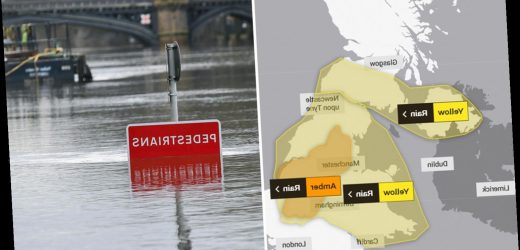STOM Christoph is to bring a "timeline of different hazards" as snow, floods, and gales are set to batter Britain.
Major incidents have been declared in both Manchester and South Yorkshire after Brits are warned that Storm Christoph could endanger lives.
⚠️ Read our UK weather live blog for the very latest news and forecasts.
Eight inches of rain is expected in the coming days, as well as snow and gales, while officials say people face a "timeline of different hazards" in the coming days.
Met Office spokesman Oli Claydon said rain is the biggest initial concern – before temperatures plunge and winds pick up later this week.
He described the situation as "a timeline of different hazards as we go through the week".
Instead of a short, sharp, stormy blast, the UK will face "really persistent heavy rain", he said – adding: "It's really just the prolonged accumulation of rainfall, rather than a short, 'come and gone' weather event."
The Met Office has issued an amber warning for rain between Tuesday to Thursday for central northern England – and the service says some towns could be cut off by the weather.
The caution covers millions living in and around Manchester, Leeds, Sheffield, Lincoln, Nottingham, Leicester and Peterborough.
According to LBC News, Greater Manchester Police have declared a major incident in advance of Storm Christoph.
A yellow warning is also in place for huge swathes of the country between Lanark in Scotland in the north and Cambridge in the south. All of Wales is covered by the alert.
Meanwhile, Ros Jones, mayor of Doncaster, has declared a major incident in South Yorkshire, telling locals: "I do not want people to panic, but flooding is possible, so please be prepared."
Sandbags have been handed out to people living in areas where flooding is expected.
STORM CHRISTOPH’S ‘TIMELINE OF HAZARDS’
THE UK will face a “timeline of different hazards
TUESDAY – Rain is "initially" the main concern. One Amber warning and two Yellow warnings for rain have been issued across the UK. A Yellow warning for ice has been put in place for northern Scotland. Within Amber warning areas rainfall could reach up to 200mm in parts of the southern Pennines and northern peak district.
WEDNESDAY – Two separate Yellow warnings for snow have been issued and areas could see as much as 20-30cm of snow. Temperatures will drop with a return of overnight frosts for most of the UK.
THURSDAY – Amber rain warning will end at 12:00 however homes and businesses are likely to be flooded causing damage to some buildings. There is a chance that there will be power cuts and loss of other services to homes.
The Environment Agency described the combination of torrential rain and melting snow as a "volatile situation", as councils prepare for possible evacuations should a severe flood warning be issued.
Catherine Wright, acting executive director for flood and coastal risk management at the Environment Agency, said: "That rain is falling on very wet ground and so we are very concerned that it's a very volatile situation.
"We are expecting significant flooding to occur on the back of that weather."
She said the Environment Agency will be working with local authorities to help with evacuation efforts should a severe flood warning be issued, adding: "If you do need to evacuate then that is allowed within the Covid rules the Government has."
The amber warning is in place throughout the next three days.
Particularly heavy rain is expected to fall overnight, and forecasters say homes and businesses are likely to flood, causing damage to some buildings.
The Met Office has issued a 'danger to life' warning due to fast-flowing or deep floodwater, while there is a "good chance" some communities may be cut off by flooded roads.
The northern Peak District and parts of the southern Pennines will be among the worst-hit, with deep flooding predicted.
But the highest rainfall recorded overnight was in Aberllefenni, west Wales, where 35.4mm fell between midnight and 8am on Tuesday.
Of the areas in the amber warning zone, Bolton in Greater Manchester has seen the most rain so far, with 24.4mm over the same period.
Some rivers, including the Ouse, have already burst their banks.
The Met Office's chief meteorologist Dan Suri said: “Following a cold spell where the main hazard was snow, our focus now turns to notably heavy rain moving across the UK this week.
"Some locations could see over 100mm of rain falling through the course just a couple of days, with up to 200mm possible over higher ground.
"These amounts of rainfall, along with snow melt present a real threat of flooding and people should keep a close eye on flood warnings.
“As the system moves away into the North Sea Wednesday night and Thursday morning, there will be strong winds along the east coast for a time.
"Meanwhile, colder air coming southwards into the weather system brings the risk of further snow on the back edge of this system.
"Temperatures will gradually fall across the UK through the end of the week and into the weekend bringing a return to widespread overnight frosts.”
Christoph will also bring 60mph winds, he said.
A third weather warning for snow and ice is in force in Scotland from Dundee to Elgin and across the east coast from Wednesday afternoon until midday on Thursday.
The Environment Agency issued nine flood warnings covering parts of Yorkshire, Cambridgeshire and Lincolnshire as of Monday night, with a further 109 flood alerts, meaning flooding is possible, across northern England, the Midlands and the east.
In Wales, nine flood alerts have been issued, while five alerts are in place for Scotland.
Highways England advised drivers to take extra care on motorways and major A roads, while the RAC breakdown service said motorists should only drive if absolutely necessary.
There was also severe flooding in Holywell, Cambridgeshire after the river burst its banks.
Met Office meteorologist Tom Morgan said: “It's going to feel quite different to last week, with temperatures in double figures.
"Our main concern is heavy and persistent rainfall falling over the Peak District and parts of the Pennines which could combine with melting snow to cause flooding."
The Environment Agency says ground in norther, central and eastern England is "already saturated" – and the rainfall, together with snow melt, is expected to cause "significant" flooding.
Katharine Smith, flood duty manager for the organisation, said teams are out closing flood barriers and clearing grills.
"We urge people to keep away from swollen rivers and not to drive through flood water – it is often deeper than it looks and just 30cm of flowing water is enough to float your car," she said.
Meanwhile, in Scotland, a video has surfaced of a VW that crashed in heavy snow during an apparent lockdown joyride.
The short clip, posted on YouTube, appears to have been recorded by the passenger of the vehicle.
It shows the Passat racing along a narrow, icy lane, while people inside laugh.
The vehicle then hurtles over a bridge, passing a car coming in the opposite direction at high speeds, before suddenly spinning out of control.
Source: Read Full Article






























